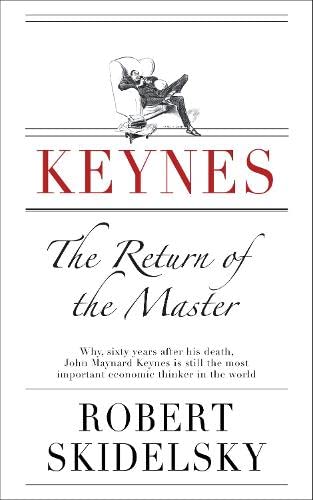Items related to Keynes: The Return of the Master

"synopsis" may belong to another edition of this title.
"The book offers clear and cogent critiques of modern macroeconomic thought, along with a brief but useful summary of what went wrong in 2007-9."
"Financial Times", October 18, 2010"Skidelsky's succinct, lively, unashamed paean analyses Keynes's core values and offers a persuasive pitch for the contemporary relevance (and necessity) of his ideas."
"Foreign Affairs"
The book offers clear and cogent critiques of modern macroeconomic thought, along with a brief but useful summary of what went wrong in 2007-9.
"Financial Times," October 18, 2010 Skidelsky s succinct, lively, unashamed paean analyses Keynes s core values and offers a persuasive pitch for the contemporary relevance (and necessity) of his ideas.
"
Foreign Affairs
"The book offers clear and cogent critiques of modern macroeconomic thought, along with a brief but useful summary of what went wrong in 2007-9."
Financial Times, October 18, 2010"Skidelsky's succinct, lively, unashamed paean analyses Keynes's core values and offers a persuasive pitch for the contemporary relevance (and necessity) of his ideas."
"About this title" may belong to another edition of this title.
- PublisherAllen Lane
- Publication date2009
- ISBN 10 184614258X
- ISBN 13 9781846142581
- BindingHardcover
- Edition number1
- Number of pages240
- Rating
Shipping:
FREE
Within U.S.A.
Top Search Results from the AbeBooks Marketplace
Keynes : The Return of the Master
Book Description Condition: Very Good. 1st Edition. Used book that is in excellent condition. May show signs of wear or have minor defects. Seller Inventory # GRP104930674
Keynes : The Return of the Master
Book Description Condition: Good. 1st Edition. Former library book; may include library markings. Used book that is in clean, average condition without any missing pages. Seller Inventory # GRP69135288
Keynes: The Return of the Master
Book Description Hardback. Condition: Fine. Seller Inventory # GOR010169266
Keynes: The Return Of The Master
Book Description Soft cover. Condition: Very Good. Limited Edition. Sept 2009 trade paperback uncorrected proof (may differ from finished book). Folds on cover, denting, light soil and curling, else text clean, binding tight. Seller Inventory # ABE-1646345275275
Keynes: The Return of the Master
Book Description Hardcover. Condition: Good. No Jacket. Former library book; Pages can have notes/highlighting. Spine may show signs of wear. ~ ThriftBooks: Read More, Spend Less 0.8. Seller Inventory # G184614258XI3N10
Keynes: The Return of the Master
Book Description Condition: Very Good. This book is in very good condition and will be shipped within 24 hours of ordering. The cover may have some limited signs of wear but the pages are clean, intact and the spine remains undamaged. This book has clearly been well maintained and looked after thus far. Money back guarantee if you are not satisfied. See all our books here, order more than 1 book and get discounted shipping. . Seller Inventory # 7719-9781846142581
Keynes: The Return of the Master
Book Description Paperback. Condition: Very Good. In the current financial crisis Keynes has been taken out of his cupboard, dusted down, consulted, cited, invoked and appealed to about why events have taken the course they have and how a rescue operation can be effected. Why have we gone back so emphatically to the ideas of an economist who died fifty years ago? There are three main ideas of Keynes' worth thinking about now. The first is that the future is unknowable, and therefore that economic storms, especially those originating in the financial system, are not random shocks which impinge on smoothly-adjusting markets, but part of the normal working of the market system. The second idea is that economies wounded by these 'shocks' can, if left to themselves, stay in a depressed condition for a long time. That is why governments need to have and use fiscal ammunition to prevent a slide from financial crisis to economic depression. The third concerns what he termed 'organicism': societies are communities not, as he put it, 'branches of the multiplication table'. This limited his support for the pursuit of efficiency at all costs. The ideas of John Maynard Keynes have never been more timely. The book has been read, but is in excellent condition. Pages are intact and not marred by notes or highlighting. The spine remains undamaged. Seller Inventory # GOR001345856
Keynes: The Return of the Master
Book Description hardcover. Condition: Good. All orders are dispatched the following working day from our UK warehouse. Established in 2004, we have over 500,000 books in stock. No quibble refund if not completely satisfied. Seller Inventory # mon0006733136
Keynes: The Return of the Master
Book Description Condition: Very Good. Shipped within 24 hours from our UK warehouse. Clean, undamaged book with no damage to pages and minimal wear to the cover. Spine still tight, in very good condition. Remember if you are not happy, you are covered by our 100% money back guarantee. Seller Inventory # 6545-9781846142581
Keynes : The Return of the Master
Book Description Condition: Good. 1st Edition. Ships from the UK. Former library book; may include library markings. Used book that is in clean, average condition without any missing pages. Seller Inventory # GRP69135288

